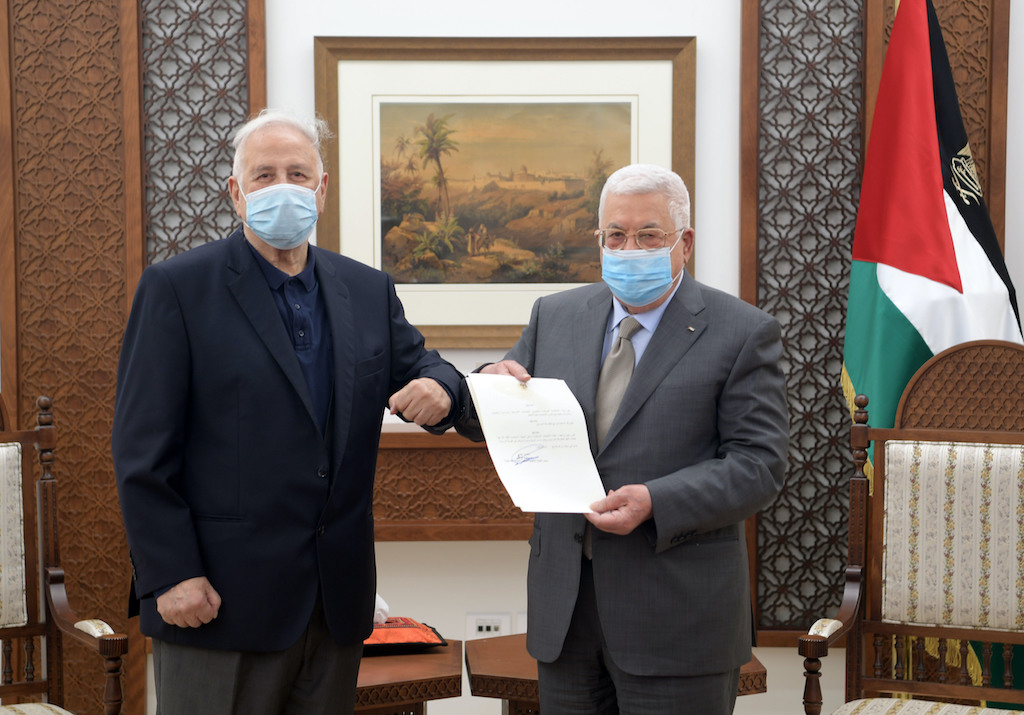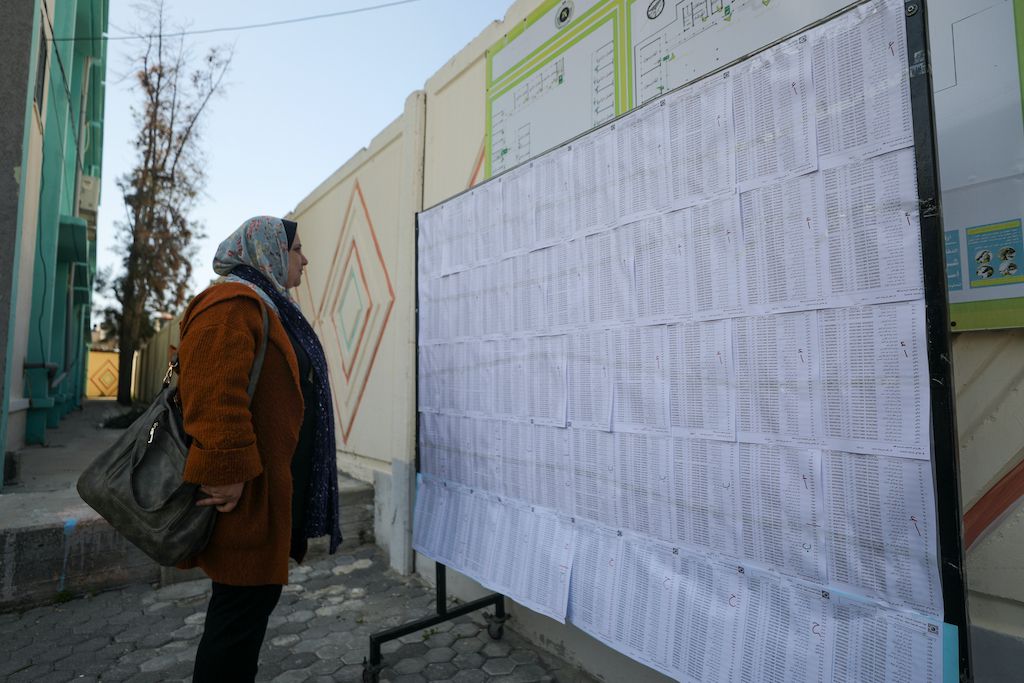Palestinian leaders attempt a political comeback
After years of internecine conflict, the Palestinian territories’ main actors have agreed to hold elections in 2021. They hope to signal a pro-democratic agenda to the West. The current leader of the Palestinian Authority could find himself dethroned.

In a nutshell
- The Palestinian leaders are responding to the Abraham Accords’ success
- The main Palestinian factions remain at loggerheads
- The incumbent leader can lose if a vote does take place
On January 15, 2021, Mahmoud Abbas, president of the Palestinian National Authority (PA) issued a decree announcing that the long-delayed elections for the PA parliament, elected for five years in 2006, would be held on May 22 of this year.
The president and his entourage believe that presenting a united front could help bring back the Palestinian problem to the forefront of Middle East politics. The move comes after the United States’ “Deal of the Century” policy initiative and the establishment of relations between Israel and several Arab states. A demonstration of Palestinian unity through democratic process is also expected to impress the new American administration.
The vote for the president, who was elected in 2005 but whose mandate expired in 2010, is to be held on July 31. Elections for the Palestinian National Council, which represent Palestinians from abroad, will follow on August 31, 2021. Difficult negotiations between Fatah leaders in Ramallah and Hamas leaders in Gaza went on for months until they agreed to a reunification process through elections.
Facts & figures
The two main Palestinian forces
Fatah, formerly the Palestinian National Liberation Movement, is the largest faction of the multiparty Palestine Liberation Organization (PLO) and the second-largest party in the legislative council. It controls the Palestinian territories in the West Bank.
Hamas is a militant Palestinian Sunni-Islamic organization that controls the Gaza Strip; it has a social service wing, Dawah, and a military wing, the Izz ad-Din al-Qassam Brigades.
The Palestinians welcomed President Abbas’s announcement. They are weary of the corruption, mismanagement and lack of democracy in the territories administered by his regime. There is a deep-seated wish for younger, honest leaders who would redress the economic situation and adopt a realistic approach to negotiations with Israel.
Disunity problem
Hamas, which had won the 2006 parliamentary elections, launched a bloody takeover in the Gaza Strip in 2007, driving out PA and Fatah representatives. Subsequent attempts at reconciliation failed because the two sides have fundamentally opposing objectives, which even their common fight against Israel cannot reconcile.
Historically, Fatah has held the most seats in all Palestinian institutions. It also controls the Palestine Liberation Organization (PLO), acknowledged by Arab states as the sole legitimate representative of the Palestinian people. Mr. Abbas, who heads Fatah, is both head of the PLO and president of the Palestinian Authority established by the PLO following the 1993 Oslo Accords with Israel.
Hamas hopes to win the upcoming elections and become the democratically elected leader of the Palestine Authority.
Created in 1987 as an offshoot of the Muslim Brotherhood, Hamas is an extremist Islamic movement that considers the PLO a traitor to the Palestinian cause; its goals are first to take over the PA and then destroy the Jewish state to establish an Islamic caliphate. Branded a terror organization by most Western countries, the movement has been fomenting insurrection in the Palestinian territories controlled by Ramallah and planting the seeds of a paramilitary force. Today, it hopes to win the upcoming elections and become the democratically elected leader of the PA.
No one believes Hamas would ease its grip on Gaza or put its dreaded security forces under the control of a central government. It is also highly unlikely to dismantle its military wing created to fight Israel.
President Abbas claims he opposes armed struggle and encourages “peaceful means” to advance the Palestinian cause. But these means apparently include throwing stones and incendiary bombs and shooting or knifing civilians. Ramallah authorities pay salaries to the perpetrators and their families. Those payments are equal to several times the average monthly wage and amount to 7 percent of the Palestinian budget. (In response to this situation, the Trump administration initiated the Taylor Force Act, which significantly reduced U.S. economic aid to the PA. The 2018 legislation was named after a U.S. veteran assassinated by a Palestinian terrorist in Israel.)
Palestinian leaders’ expectations
Following the publication of his decree, the Palestinian president sent a letter to Washington. He described what had been agreed upon by the Palestinian factions, notably Fatah, Hamas and Islamic Jihad. They were all, Mr. Abbas stated, committed to popular resistance until a Palestinian state is established along the 1967 borders, with East Jerusalem as its capital. They pledged to follow international law and recognize the PLO as the sole legitimate representative of the Palestinian people. They would also ensure a peaceful transfer of power according to election results.
The letter was intended to lead to renewed contacts between the Palestinian leaders and the U.S. administration.
In short, the pledge is to behave in line with the values of Washington’s new democratic administration. The document was allegedly written upon the advice of pro-Palestinian officials recently nominated by U.S. President Joe Biden. (One of them is rumored to be Robert Malley, who was in charge of the negotiation with Iran and tried to have Hamas removed from the list of terror organizations.) The letter’s intent was also to lead to renewed contacts between the Palestinian leaders and the U.S. administration. These relations would be based on Security Council Resolution 2334 passed as President Barack Obama’s mandate was coming to an end. The resolution condemned Israel’s settlement activity and stated that no change to the 1967 borders would be accepted.
Hamas hopes that presenting a seemingly more moderate position to the U.S and the European Union will secure part of the international assistance it badly needs for the Gaza Strip. The Palestinian Authority no longer pays civil servants there, while Hamas uses the billions of dollars donated by Arab countries and welfare associations to arm its military toward a confrontation with Israel.

Hamas steadfastly refuses to abide by the three conditions set down by the Middle East Quartet – the United Nations, the U.S., the EU and Russia – to remove it from the list of terror organizations. These are: to stop terrorist acts, recognize Israel and accept the Oslo agreements. Hamas has not announced a change of mind yet.
Neither has another Palestinian faction, the Popular Front for the Liberation of Palestine, which refuses to acknowledge Israel’s right to exist. After Mr. Abbas’ letter became public, the Iran-founded and financed Islamic Jihad Movement in Palestine, announced its withdrawal from the agreement.
Possible contestants
The letter said nothing on practical matters such as how the elections will be organized or what will happen once the results are in. It is difficult to envision President Abbas gracefully accepting the defeat all public opinion polls predict. Hamas leader Ismail Haniyeh is seen as a sure winner of the presidential elections. Both men spoke on the phone and let it be known that clear understandings will have to be negotiated. Meanwhile, Hamas has not freed its political prisoners, mostly Fatah supporters and the PLO, and the PA is still arresting Hamas militants.
There are other obstacles to the current president’s reelection. Marwan Barghouti, founder and leader of Tanzim, the military arm of Fatah during the Second Intifada, is serving five life sentences in Israel for several terror attacks and murders. His popularity remains significant and, while in jail, he won a surprise first place in an election to the Fatah central committee. He is considered a pragmatic actor who would talk to the Israelis. Should he decide to run against the sitting president, surveys show him a clear winner.
Top U.S. officials do not know how to deal with the remote eventuality of Hamas becoming part of a Palestinian government.
Then, there is Mohammed Dahlan, once in charge of security in the Gaza Strip and a Fatah luminary. His differences of opinion with Yasser Arafat and, later, with Mahmoud Abbas, led to his fall. Considered moderate and not against an acceptable compromise with Israel, he now lives in the United Arab Emirates, where he allegedly serves as a close advisor to Crown Prince Mohammed bin Zayed. At his instigation, the Emirates recently dispatched 20,000 doses of the Russian-made Sputnik V Covid vaccine to Gaza. Born in 1961, many see in him as someone who could lead the younger generation; he has supporters in Gaza and the Palestinian Authority.
Of late, senior Fatah member Nasser al-Qudwa, the nephew of the late Yasser Arafat and former Palestinian Authority’s representative to the UN, announced his intent to create an independent list that would endorse the Barghouti candidacy. Fearing it might split Fatah, President Abbas promptly expelled him from the organization. Former Prime Minister Salam Fayyad is also said to consider running.
Surprise for the U.S.
Washington’s official reaction to the elections pledge did not meet Palestinian expectations. During the campaign, candidate Biden and his aides had stated that they would not go back on recognizing Jerusalem as the capital of Israel and that the embassy would remain in that city. However, they did promise to renew U.S. assistance to the Palestinian Authority and the UN’s relief agency, halted by President Trump, and reopen the PLO offices in Washington he had closed. Even before his appointment, Secretary of State Blinken stated that the U.S. favored the two-state solution and would work to promote it. He repeated it in his first conversation with Israeli Foreign Minister Gabriel Ashkenazi. Nonetheless, there has been no reaction from the White House to the Abbas letter.
The announcement might have come as a surprise to the Biden administration, which intended to renew its dialogue with Ramallah and bring about a reopening of negotiations with Israel. Its top officials do not know how to deal with the eventuality, however remote, of Hamas – still designated as a terror organization in the States – becoming part of a Palestinian government. They declared they would not comment until Hamas accepts the Quartet’s conditions.
Scenarios
Bitterly disappointed, Palestinian leaders complain they are getting the cold shoulder from Washington after having consented to long-standing demands from the international community to hold elections.
The Palestinian president may have painted himself into a corner by giving credence to unsupported promises from pro-Palestinian advocates in the Democratic party. The EU appears to be in no hurry to comment either. However, it seems that despite the problematic Hamas-Fatah alliance, the Union would support holding the elections provided they are free and democratic. It would then lend its help to the elected government. Unnamed sources apparently even warned President Abbas not to cancel the elections.
Arab countries, preoccupied as they are with their own economic and public health problems, remain silent. Following the Abraham Accords, the Palestinian question is no longer a priority. The Emirates, Bahrain, Sudan and Morocco are currently carrying out the normalization process with Israel and would be happy to leave the Palestinians to the U.S and the EU. Egypt and Jordan, frequently consulted by President Abbas, are helping but also keeping a close eye on how Israel's new alliances develop.
Arab commentators from all Arab states quoted in the local and international press are skeptical about the Palestinian move, suggesting that either the elections will not be held or will not lead to a union between Ramallah and Gaza. Most are afraid of a Hamas takeover. Arab public opinion understands that though elections are needed to inject new blood into the Palestinian Authority, there is a real risk of instability and increased tension with Israel.
Jerusalem has also remained silent. It is believed that the elections will not occur since no compromise acceptable to Ramallah can be found between Hamas and Fatah. The fact that Gaza and Ramallah are two distinct entities is convenient to Israel since it hampers the creation of a united, independent Palestine. There is one additional issue: according to President Abbas, elections must include the Palestinian citizens living in East Jerusalem. This could be seen as a challenge to Israel’s claim of sovereignty over the whole city. In the 2005 and 2006 elections, Israel had agreed to such an inclusion under American pressure. It now appears that Israel may agree again – on the condition that the voting would be carried in polling stations outside Jerusalem.
What comes next? President Abbas could resign and endorse a candidate, but this seems unlikely. Should it happen, candidate Barghouti will probably run from his jail cell and handily defeat candidate Dahlan. The international community would then put intense pressure on Israel to release him.
In all likelihood, however, President Abbas will cancel the elections for all the reasons stated above, though he will look for a plausible excuse. The Covid-19 pandemic might be his way out. The Americans would be quietly happy, as it would spare them conflicts with Israel. Arab states would relax, hoping that the new administration will turn its attention to the Abraham Accords and press other countries to join the process.
Cynics would suggest that this was Mr. Abbas’s intent all along. No progress, it seems, can occur until he has left the scene.








